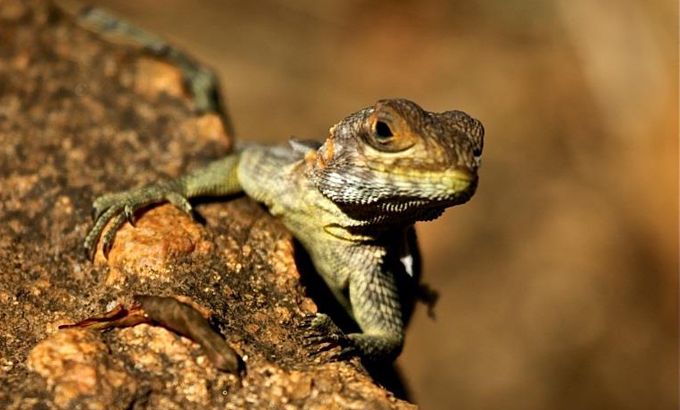
Return of the Lizard King
101 East exposes an infamous wildlife trafficker at the helm of an illegal multi-million dollar business.

The illegal trade in wildlife is thought to be worth at least $19bn a year, a sum rivalled only by the black markets in drugs, counterfeit goods and people.
But while drugs and people smuggling are seen as profitable but extremely risky, the wildlife trade has become increasingly attractive to criminal networks because it is not only lucrative but the risks are far lower. The animals caught up in the trade – assuming they even survive the journey – often end up as pets, traditional medicines or food.
Keep reading
list of 4 itemsHong Kong’s first monkey virus case – what do we know about the B virus?
Indonesia hunts for ‘extinct’ Javan tiger
In Colombia, hunting poachers, not drug traffickers
The US State Department says trafficking not only undermines conservation, it also threatens the rule of law and is a risk to global health. The concern is now so great that the trade has been designated a new form of transnational crime.
For more than two decades, Anson Wong has been the internationally recognised “face” of the trade; the ‘Pablo Escobar’ of animal trafficking, according to some. The Malaysian’s notoriety stems from 1998 when he was arrested by US agents after they lured him to Mexico in a highly elaborate five-year investigation that became a best-selling book, The Lizard King . He was later convicted for smuggling endangered species and sentenced to 71 months in prison.
When Wong returned to Malaysia, his permits reportedly revoked, and many suspected he had returned to the business. In 2010, those fears were confirmed when Wong’s bag broke open while he was in transit to Jakarta to reveal 95 boa constrictors.
Initially sentenced to five years in jail, his term was cut to 17 months on appeal and Wong was released in February 2012, despite evidence of his involvement in other smuggling cases.
Once again, he is back home in Penang, Malaysia. And once again, the Malaysian authorities say his permits have been revoked. Since getting out of prison, new reports have surfaced of his return to the illegal wildlife trade.
101 East goes undercover from Madagascar, to Thailand, to Indonesia and to Malaysia in an attempt to follow the trafficking trail and to infiltrate Wong’s syndicate.
Our journey starts in Madagascar with the Durrell Wildlife Conservation Trust, an animal protection group that has spent decades trying to save the very endangered tortoises that Anson Wong has poached. There are only 400 adult Ploughshare tortoises left in the wild. And the fear among Durrell’s workers is that they will soon fall prey to traffickers. The organisation’s top representative in the country, Richard Lewis, says Wong to them is enemy no. 1, and all employees are warned to be on the lookout for him.
In Madagascar, we speak to Sarah Sahondrarisoa, a Malagasy woman who in 2010 was convicted of trying to smuggle endangered Ploughshares from Madagascar to Malaysia for Anson Wong. While she served eight months in jail, Wong has never been tried for his alleged involvement.
A man who worked for years with Wong, who we call “X”, helps us see into the mind of the Lizard King and shares what motivates him. He also explains the routes taken by the Lizard King and his associates to smuggle valuable species from his favoured spots in species-rich Madagascar to Malaysia. He too confirms that Wong is still in business.
In Madagascar’s capital of Antananarivo, we also come across Mario, the son of a presidential candidate, and an exporter of seafood and reptiles. He admits to having helped Anson Wong several years ago with a few shipments. Believing 101 East presenter Steve Chao is a reptile dealer, he offers to introduce Chao to one of his contacts. That contact produces samples – numbers of Radiated tortoises (the second most endangered in Madagascar) and promises that with the help of customs officials on-the-take, he will be able to ship hundreds at a time to a destination of Chao’s choosing.
The ease of buying endangered species underlines how despite 40 years of efforts by the international community to combat wildlife trafficking, poachers and smugglers continue to get away with their crimes, aided in large part by officials in various countries.
In Indonesia, Daniel Tanuwidjaja, one of Wong’s trusted distributors, claims he pays off wildlife and customs officials in both Indonesia and Malaysia to allow for shipments from Wong. He also says that the Lizard King continues to deal, and that Wong’s wife is increasingly involved in the business.
Chao then flies to Wong’s hometown of Penang, Malaysia, where he follows a paper trail of public records to various properties owned by the Lizard King, his family and associates. There he uncovers shell companies used to hide the illicit trade in reptiles, and also stumbles on a number of exotic wildlife awaiting buyers. Malaysian officials meanwhile insist that bans on his business and trading licences continue to be enforced, despite evidence on the contrary. It leads N Surendran, an opposition MP, to call for an official investigation into alleged corruption.
In the closing scenes, Chao, after a year-long investigation, finally tracks down the Lizard King and in a final confrontation, he presents to him the evidence 101 East has gathered.
On the trail of wildlife trafficking
By Steve Chao
You could say this investigative film was born out of failure – the failure of enforcement agencies, of international bodies like the UN, and the failure of the public as a collective to protect the world’s most rare and iconic species.
This is the 40th year of CITES, an international pledge signed in 1973 by countries to save threatened animals and plant-life. Yet by all accounts, wildlife smuggling continues and is increasing at such an alarming rate, the UN has warned that over the next decade, more species than ever could be hunted to extinction.
Where did we as a global society go wrong? Why is it that despite growing awareness of the need to protect animals and despite the millions of dollars spent training customs and law enforcement agencies in various countries, poachers continue to empty the world’s forests?
That is what we set out to discover in what turned into a year-long examination into the dark underworld of animal trafficking.
During our research, we received reports – almost daily – of shipments of ivory or of endangered species being routed from parts of Africa and Asia to customers worldwide. It was soon clear to us that this black-market trade of pets and animal parts was massive – estimated at $19 billion a year; and that it was only made possible with the help of government officials in their respective countries.
For this film, we wanted to put a face to wildlife crime. What we were told by experts and animal rights groups, was that it already had one – the notorious Lizard King, Anson Wong.
Known as the “Pablo Escobar of the Reptile Trade”, Wong in 2012 was released from prison in Malaysia after serving just 17 months of what was supposed to have been a five-year jail term.
Sources told us that even while completing his prison sentence (for trying to smuggle snakes aboard a plane bound for Indonesia), Wong had continued trading in endangered species.
If true, it would not be that surprising, considering that – according to those previsouly inside Wong’s network – during his first stint in prison for wildlife trafficking in 1998 in the United States, Wong had done just that; carrying on with his business with the help of his wife and close associates.
Still, would it be possible, that he would be back at his old game for which he has spent several years in jail?
Our investigation to find out took us to various countries, from Madagascar, to Thailand, to Indonesia, and finally to Malaysia. Posing as dealers, we got inside the Lizard King’s syndicate, speaking to longtime distributors, to allies-turned rivals, to current-day employees. We presented our sometimes alarming findings to experts, who said that none of the Lizard King’s present day operations would be possible without the complicit help of Malaysian authorities.
For many, it will feel a bit of deja-vu. The actions of the Lizard King and his accomplices have been covered extensively in the past in books along with documentaries. But again, that is the point. That in spite of the public scrutiny, in spite of past convictions, in spite of supposedly toughened laws against wildlife crime – little has changed.
Well, perhaps some has. Insiders say since being in a Malaysian jail, Anson Wong has lost his standing at the top of the reptile smuggling world. But he is fighting to regain his position – something we became keenly aware of as we hunted the hunter across the globe.